- Home
- Robert Asprin
For King and Country Page 38
For King and Country Read online
Page 38
"Name it," Morgana said quietly.
Riona's eyes were hard as flint in the firelight.
"Help him kill the Saxons."
Chapter Seventeen
Trevor Stirling was getting used to forced marches, short sleep, and foul weather.
The SAS should train half so hard, he grumbled, although he did so with a fair dose of wry humor.
Aye, Ancelotis sighed, war is no business for the faint of heart, nor those weak of constitution.
It was an unexpected compliment and one Stirling valued, considering the source—Ancelotis' unhappily broad experience of warfare at a level and brutality which still had the power to raise the fine hairs on the nape of his borrowed neck. He and his host had ridden far ahead of Artorius and the bulk of the army rushing south as fast as their infantry could travel. Ancelotis and Stirling were accompanied by more than a hundred cataphracti from Ancelotis' own Gododdin, men headed south toward Caer-Badonicus in answer to the summons he'd sent out several days previously.
The Sarmatian bows most of them carried were heavy-pull compound bows made of horn in the Scythian style, perfect, deadly weapons for a force of heavy cavalry. The Romans had learned at great cost—an entire legion, slaughtered to the last man—what such bows could accomplish against infantry. Those bows gave Stirling ideas. Really nasty ideas. And he ought to arrive at Caer-Badonicus in plenty of time to implement them.
"Ride ahead with word that we are on the march," Artorius had told him shortly after finding Lailoken's abandoned packhorse. "We'll need some kind of signal to let you know when we've come close enough to Caer-Badonicus to break the Saxons' siege with our infantry as well as the rest of our cavalry."
Stirling considered the possibilities for a moment. He knew multiple ways to send coded signals, but which of them were most easily adapted to current conditions? "Have you any polished mirrors?" he asked thoughtfully.
Artorius' brows flicked upward in surprise. "Mirrors? I suppose I could lay hands on a polished bronze mirror, readily enough. Why?"
"Light flashing from a mirror travels a long way. You could devise a simple code and use sunlight on the mirror to send us the message you're close by."
Artorius tugged at his lower lip for a moment. "I seem to recall reading, many years ago, as a boy under Myrddin's tutelage, that one of the Roman emperors used a mirror to send long coded messages from the mainland to one of the islands, Sicily or Sardinia, I can't recall which, now. And the Visigoths who've taken over Rome use signal fires, it's said, occluded by some barrier like a blanket, to flash out numerical patterns. They keep codebooks to translate the number flashes into words."
"Perfect," Stirling nodded. "When you reach a point within a few miles of Caer-Badonicus, use the mirror flashes if it's by day or an occluded fire if by night." He couldn't help chuckling, thinking about Rudyard Kipling again, the poem about the young British officer stationed in India, using the heliograph to flash messages to his "darling poppsy-wop," warning his bride against General Banks, that "most immoral man"—a warning inadvertently seen and decoded by none other than the general himself.
"We'll use a simple numerical replacement system," Artorius decided with a grin. One flash is 'A,' two are 'B' and so on, through the Latin alphabet. Look for the signals from the highest of the Mendip Hills. Flashes from there will be seen easily from the summit of Caer-Badonicus. And you can signal back where the Saxons' greatest troop concentration is camped."
Stirling chuckled. "With pleasure."
"Watch the northern horizon for the signal then, and when it comes, you'll know relief is only a few miles away. Cadorius and Melwas must fight a holding action if the Saxons reach Caer-Badonicus ahead of our main force. Which I suspect they will. King Aelle of Sussex would be a fool to delay, once Cutha's brought news of our disarray in the north. God help us, two kings dead and a queen..." Artorius hesitated, spat to one side, then muttered, "Enough said about Morgana. God help us, even Ganhumara worries me less."
Stirling's host would have liked to say something comforting, but Ganhumara was trouble everywhere she turned her attention. Ancelotis of Gododdin was too honest a man to mouth platitudes nobody believed, so he and Stirling took their leave silently, to begin yet another body-numbing forced march. Stirling had no idea where Caer-Badonicus was—its location remained one of the twenty-first century's greatest Arthurian mysteries—nor how many horses he would have to change out along the way. Not too many, he hoped, for the armies moving ahead of them surely would have rounded up every stray cart horse and fat pony to be found.
I hope you have some idea where we're going, Stirling groused, trying in vain to ease himself in the saddle, stiff and aching from sitting too long in one position. "South" covers a lot of territory.
Stirling's attitude only amused Ancelotis, who was a well-educated man, by sixth-century standards. Don't fret, Ancelotis advised, we Britons know how to locate a place accurately enough, even if you don't. It's the roads, lad, the Roman roads, that tell us how far south or west or northeast to ride after a marked junction. Every man of us—and most of the women, for that matter—knows the maps of these wondrous roads, even if he learns nothing else from his priests or Druids. It's the roads that tie us together, bind us into one people. Without them, we couldn't hope to mass this kind of force on such short notice.
Stirling's brows twitched upward. He'd never thought of using roads in symbolic terms before, as a metaphor of power and unification. He was simply too accustomed to their presence as a network of tools to get a person where he wanted to go in the shortest amount of time possible, given the physical terrain and its obstacles. He felt a little foolish, particularly since a good officer took very careful account of such things as logistics, how to move men and war materiel from one point to another in the most efficient manner possible.
Ancelotis nodded. You've the right of that. It pays a man well to remember that the Romans, a people of very small physical stature, for the most part, still conquered a very large chunk of the known world and held it for centuries upon centuries, with fast and good roads to move their legions and supply trains. 'Tis the roads, right enough, that are the saving of Britain, as much as Artorius' skills at organizing a battle.
The idea that stole into Stirling's mind, unbidden and startling, was the abrupt connection he made between the "people of the dragon," as Myrddin had dubbed the Britons, and the long network of dragonlike scutes that comprised the top layer of Roman paving stones. Those "dragon's scales" stretched from the Antonine Wall south to Cerniw, from the western shores to the eastern lands now held by the Saxons of Sussex and Wessex. Having seen the might of Roman engineering in other cities and having studied military accounts like Caesar's Gallic War, Stirling appreciated with sudden, startling clarity precisely what such roads could mean to a people like the Britons, widely scattered and in desperate need of unity.
And Emrys Myrddin had seen it while still a child, warning Vortigern of the danger he was unleashing against the People of the Red Dragon. A proud people connected politically and culturally via roads, long stone dragons that wound through mountains, sailed across open plains, slipped silently through deep and treacherous forests, spanned gorges and lonely, echoing valleys.
The power of the British tutelary dragon did, indeed, lie in these roads, good military highways that a cavalcade could traverse at a fast and steady pace. Roads of war. Red roads. Red dragons. Emrys Myrddin had named the dragon the tutelary beast of Britain's rightful kings—or, more accurately—her war leaders: Ambrosius Aurelianus, the last Roman among them, Uthyr Pendragon the Sarmatian, and his son Artorius.
In a very real sense, the men and women who had built the Roman roads under the direction of Roman engineers and Roman officers had not only built the blood-red dragon, they had been born from it. Born as one unified people who understood themselves to be Britons, a far-flung but important portion of the Roman empire, the last civilized bastion in the West. It was a psychological shift that lift
ed them out of tribalism and re-created them as one nation, regardless of tribe of birth. The dragon of Britain—the blazing emblem of Artorius—the half-Sarmatian Dux Bellorum, was nothing less than the mighty Roman roads of war.
Emrys Myrddin's genius in tying the symbolism—and the Britons—together left Stirling in awe. Ancelotis, who had never given the matter much thought, either, marveled. You're sure it's not a Druid you are, from the Otherworld? 'Tis certain you think like one, Stirling of Caer-Iudeu.
Huh. I'm no more a Druid than this horse we're riding. But I do know a thing or two about psychology and symbolism. Let's just agree to name Emrys Myrddin the genius he is, eh?
Ancelotis agreed as they raced along the back of Emrys Myrddin's dragon, accompanied by the cataphracti who had joined Ancelotis, traveling in a thunder of hooves against the ancient Roman paving stones. As they rode, Stirling tried to reconcile the sixth century's appalling lack of exactitude with his twenty-first-century desire for laser pin-point accuracies and satellite image-mapping systems, literally accurate down to the fraction of a millimeter. He mourned the loss of technology so precise that it was used, among other things, to map the rate of continental drift across the tectonic plates. With one decent satellite photo, Stirling could have pinpointed the exact location of the Saxon army boiling up from Sussex and Wessex toward the southwest of England, using that knowledge to gauge their speed, their likeliest route, and their numerical strength. He would have been content with something as relatively primitive as aerial reconnaissance from a hot-air balloon.
You're sure you can't pinpoint Caer-Badonicus more precisely? he fretted silently.
Ancelotis tried to come up with landmarks his twenty-first-century guest might recognize. I've never been there, understand, but I'm told it's near the border between Glastenning and Caer-Durnac, farther south than Roman Bath. It's west of Stonehenge, Ancelotis added, but a good way east from the Cheddar Caves. As Stirling listened, he pinned imaginary flags into his mental map of the south of England, triangulating from those three points and coming up with Salisbury Plain. Where in that broad sweep of flat land would one put a critically strategic hill fort? Then he saw it, a probable location that elicited a startled grunt. Cadbury Hill?
As he thought about it, Stirling's smile faded, replaced with a thoughtful frown. Such a location for Caer-Badonicus made sense. An army trying to take—or hold—the southwestern portion of England would be forced to guard against any detachment of troops camped on that hilltop. Failure to do so would result in lightning attacks from the ancient hill fort's summit, requiring a full-scale siege to dislodge, and a siege of that magnitude would tie up resources the kings of Sussex and Wessex could ill afford for any length of time beyond a few days.
What he could have done with gunpowder and a few small mortars on that hilltop didn't bear thinking about, since there was no time to locate the ingredients and experiment with the formula, never mind cast the mortars—or even a few hand cannons—from iron or bronze. Of course, if they survived the battle at Badon Hill, there would be ample time to experiment, provided he could obtain the ingredients. Charcoal was easy and saltpeter could be found at the bottom of manure and compost piles, crystallizing out of the muck, but what about sulphur? Wasn't that found in association with hot springs and volcanic vents? Were there any sulphur deposits in Britain? The only hot springs in Britain were at Bath—and Stirling had never heard mention of sulphur deposits associated with the springs. What he needed was a nice, cooperative volcano. And that was one thing Britain simply didn't have.
Thoughts of volcanoes triggered another whisper at the back of his memory, something important he couldn't quite put his finger on. Something important to British history, linked oddly with Arthurian lore, and he couldn't remember now what it was. Stirling frowned, while Ancelotis puzzled over the tantalizing glimpses into the future resident in Stirling's memories. Ancelotis knew virtually nothing about volcanoes, outside of their connection with ancient Greek and Roman myth, things like Vulcan at his forge deep in the heart of Mt. Etna or Pliny the Younger's eyewitness account of Vesuvius, the day it erupted to bury Pompeii and Herculaneum. Why was he remembering a connection between volcanos and Arthurian legend?
Well, if Stirling couldn't figure that out, what did he know about volcanoes in general? They tended to cluster along the edges of tectonic plates grinding past or diving under one another—he knew that much at least—and they appeared along the midoceanic ridges, as well, which were tectonic plates pulling apart, stirring up a froth of magma from the mantle, which spewed up periodically in spectacular volcanic eruptions. The mid-Atlantic ridge had produced Iceland and the mid-Pacific ridge had produced a whole necklace of volcanic islands, like Hawaii in the northern hemisphere and Easter Island in the southern hemisphere.
The rim of the Pacific Ocean had been dubbed the Ring of Fire, with volcanoes from the western shores of South America and the grand volcanoes of Chile and Peru, north to the Pacific Northwest of North America and volcanoes like Mt. St. Helens, across to Japan with its highly active volcanoes and earthquakes, south past China and down into Indonesia, where the world-famous nineteenth-century blast from Krakatoa had blown an entire island into oblivion.
That particular eruption had been heard halfway across the Pacific by the admiral of the British fleet stationed in India, who'd thought the fleet was under attack by naval guns. The explosion which had destroyed most of the island had also blasted so much rock and dust into the atmosphere, there had been a literal "volcanic winter" that year—a whole year with no summer, with dark skies and snow on the ground even in temperate and warm southern zones, and crop failures turning productive agricultural belts into wastelands—
Stirling gasped.
The wasteland!
One of the most powerful, recurring images of Arthurian lore. A land so blighted, nothing could grow, a land so sick, crops died, cattle died, and people starved to death as the land failed to produce life—a condition blamed, mythically, on the impotence and injury of the king. The wasteland was part of the Arthurian Grail lore, with the cup of Christ healing the formerly pagan king's deep physical, psychic, and spiritual wounds—and with the healing of the king came the healing of the land. He'd seen the twentieth-century movie, Excalibur, with its extraordinary sequence of the land bursting into blossom once more, one of the most beautiful movie images ever filmed.
And that image jolted loose Stirling's memory, the newspaper article he'd read on the train, heading for Edinburgh and the time-travel lab. Krakatoa hadn't blown up just once. There'd been a previous eruption—in the sixth century a.d. One that made the nineteenth-century explosion look like a champagne cork popping loose. Stirling narrowed his eyes, trying to recall exactly what that article had said. So far as he could remember, the Pacific volcano had blown itself to spectacular bits somewhere between the year 536 and 539 a.d., creating worldwide ecological devastation so severe, crops had failed and ecosystems had crashed for more than ten years. A whole decade of world-spanning wasteland. Crop failures had triggered mass migrations of people across the face of the whole earth and wars of bloody genocide had been fought over land that was still producing even marginal amounts of food.
The article had mentioned something about Irish lake fortresses. Two whole villages built on stilts in the centers of lakes as war between clans and island-wide starvation made such watery retreats the only safe places for people to live, subsisting on fish caught through the floors of the lake-straddling villages. And there was a connection, too, with the beginning of the plague years.
Something about temperature changes causing plague to spread into zones that had previously been immune, carried by traders from Constantinople as far as Britain. Plague had wiped out such an immense percentage of Britain's population that the Saxons, Angles, and Jutes—who had not been trading with Constantinople and therefore had not been weakened by the disease—had essentially waltzed in and taken over from a people nearly dead of hunger and epide
mics.
There was a terrifying parallel between the end of "King Arthur's" golden years, a reign of thirty-nine to forty years after his twelfth victory at Badon Hill, and the timing of that volcanic explosion, somewhere between a.d. 536 and a.d. 539. Even with Artorius victorious at Caer-Badonicus, the Britons were doomed to lose the war to the Saxons, all because one volcanic explosion on the other side of the planet would destroy their crops, their cattle, and their strength as a unified people.
It was a vision so horrifying, Stirling found it impossible not to try and save these people from it, or at least to cushion the blow poised to fall thirty-nine years from now.
Stirling's abrupt desire to try a deliberate alteration to history far greater than the damage already wrought by Lailoken and Cedric Banning was a physical ache inside him. Dared he risk it? And what could he possibly do, even if he did decide to interfere as Banning had done? Ancelotis—stunned, amazed, and appalled by turns at Stirling's memories, suppositions, and foreknowledge that spilled like sea-foam into their shared awareness—whispered, Stirling, if these things be true, and I misdoubt them not, then we must act to save our people. And we must act quickly—but how is one man or even a handful of men to prevent something like an island blowing itself apart?
Huh, Stirling grunted. You can't. There's nothing in this world—or out of it, for that matter—that can stop a volcano from doing whatever it wants, whenever it pleases. The only thing you can do is get out of its way.
True, Ancelotis growled, but if you know a disaster is coming, you can at least prepare for it. Look at what Egypt managed, with no more warning than Joseph's interpretation of the pharaoh's dream. Seven lean cows devouring seven fat cows, seven blighted stalks of grain devouring seven fat ones. With warning, they built granaries and saved the people from starvation. Ancelotis' eyes widened slightly. Ye Gods. The Grail! A circular cup of life. If a man were to build circular cups to hold the abundance of the next thirty-nine years...

 The Complete Phule’s Company Boxed Set
The Complete Phule’s Company Boxed Set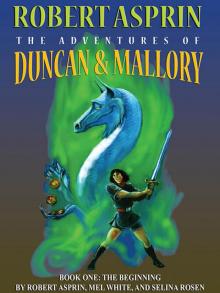 The Adventures of Duncan & Mallory: The Beginning
The Adventures of Duncan & Mallory: The Beginning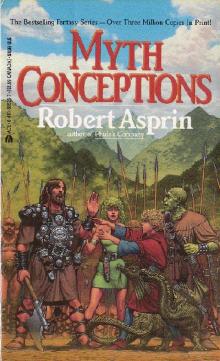 Myth Conceptions
Myth Conceptions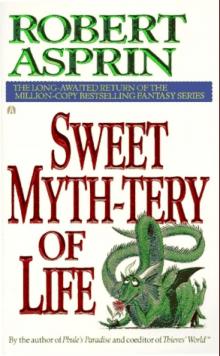 Sween Myth-tery of Life m-10
Sween Myth-tery of Life m-10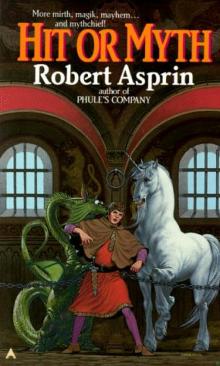 Hit Or Myth m-4
Hit Or Myth m-4 MA08 Myth-Nomers and Im-Pervections
MA08 Myth-Nomers and Im-Pervections Catwoman - Tiger Hunt
Catwoman - Tiger Hunt myth-taken identity m-14
myth-taken identity m-14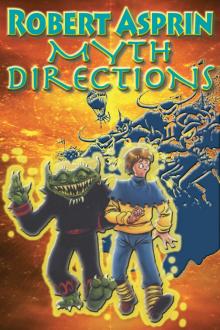 MA03 Myth Directions
MA03 Myth Directions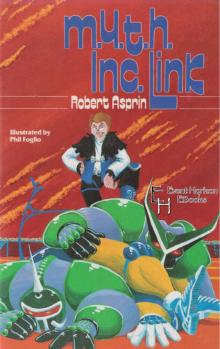 MA07 MYTH Inc Link
MA07 MYTH Inc Link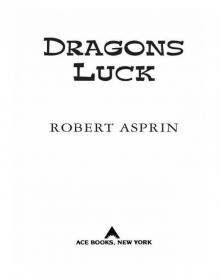 Dragons Luck
Dragons Luck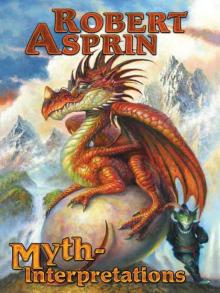 MYTH-Interpretations: The Worlds of Robert Asprin
MYTH-Interpretations: The Worlds of Robert Asprin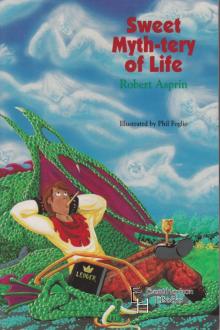 MA10 Sweet Myth-tery of Life
MA10 Sweet Myth-tery of Life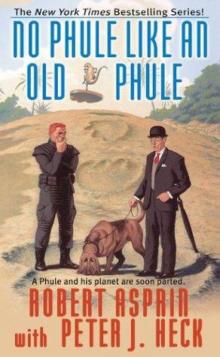 No Phule Like an Old Phule
No Phule Like an Old Phule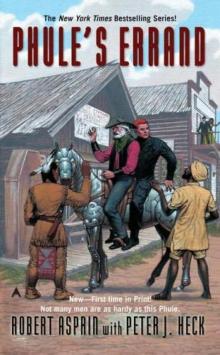 Phule's Errand pc-6
Phule's Errand pc-6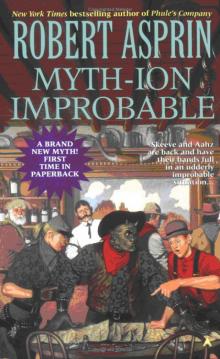 Myth-ion Improbable
Myth-ion Improbable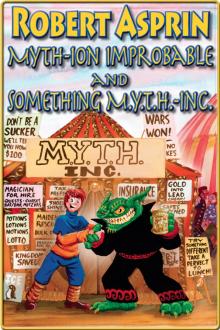 MA11-12 Myth-ion Improbable Something Myth-Inc
MA11-12 Myth-ion Improbable Something Myth-Inc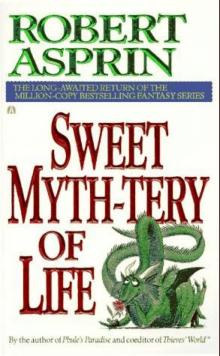 Sweet Myth-tery of Life
Sweet Myth-tery of Life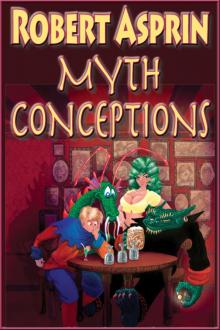 MA02 Myth Conceptions
MA02 Myth Conceptions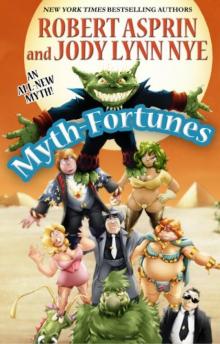 Myth-Fortunes m-19
Myth-Fortunes m-19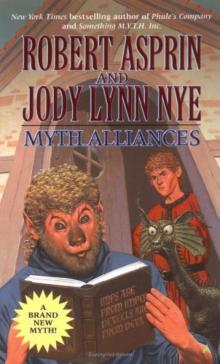 Myth Alliances m-14
Myth Alliances m-14 Wagers of Sin
Wagers of Sin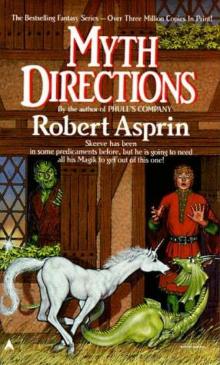 Myth Directions
Myth Directions The Bug Wars
The Bug Wars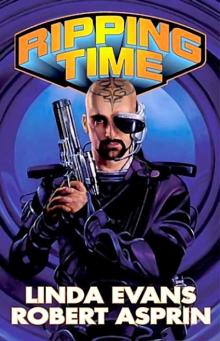 Ripping Time
Ripping Time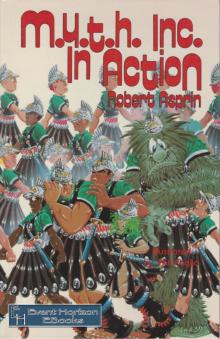 MA09 Myth Inc in Action
MA09 Myth Inc in Action MA06 Little Myth Marker
MA06 Little Myth Marker Phules Paradise
Phules Paradise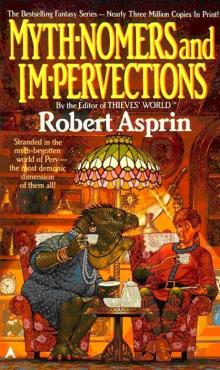 Myth-Nomers & Im-Pervections
Myth-Nomers & Im-Pervections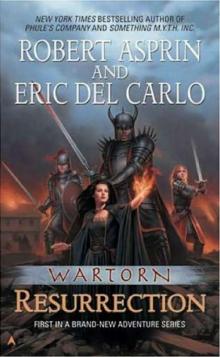 Wartorn: Resurrection w-1
Wartorn: Resurrection w-1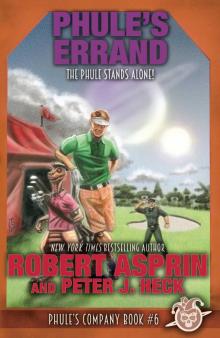 Phule's Errand
Phule's Errand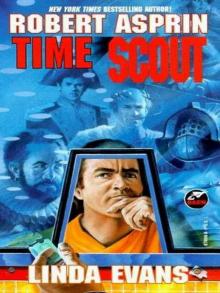 Time Scout
Time Scout Tambu
Tambu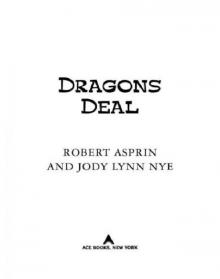 Dragons Deal
Dragons Deal MYTH-Taken Identity
MYTH-Taken Identity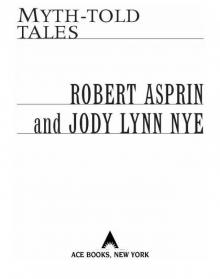 Myth-Told Tales
Myth-Told Tales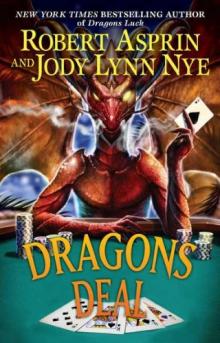 Dragons deal gm-3
Dragons deal gm-3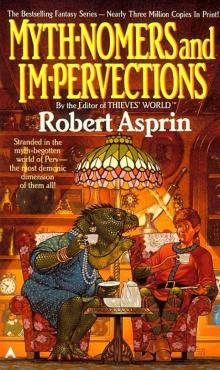 Myth-Nomers and Im-Pervections m-8
Myth-Nomers and Im-Pervections m-8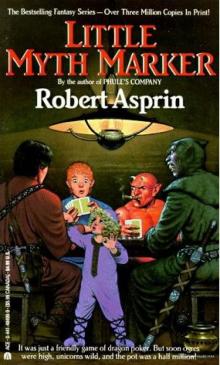 Little Myth Marker
Little Myth Marker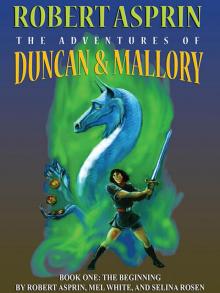 The Adventures of Duncan & Mallory
The Adventures of Duncan & Mallory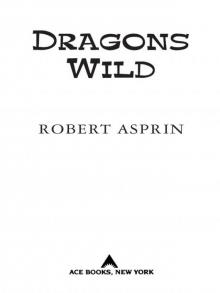 Dragons Wild
Dragons Wild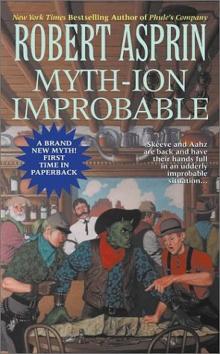 Myth-ion Improbable m-11
Myth-ion Improbable m-11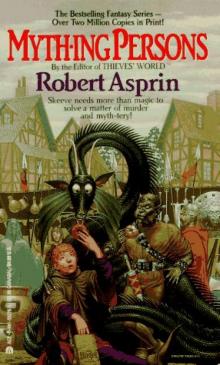 Myth-Ing Persons m-5
Myth-Ing Persons m-5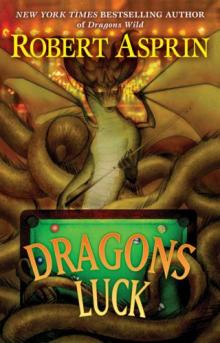 Dragons Luck gm-2
Dragons Luck gm-2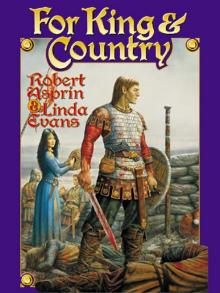 For King and Country
For King and Country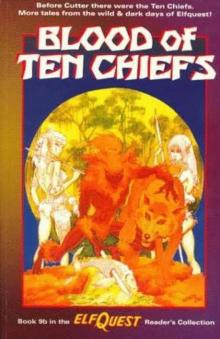 The Blood of Ten Chiefs
The Blood of Ten Chiefs E.Godz
E.Godz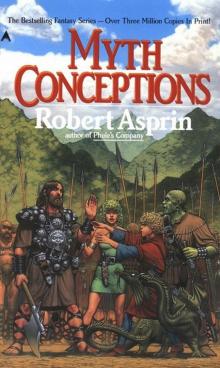 MYTH CONCEPTIONS m-2
MYTH CONCEPTIONS m-2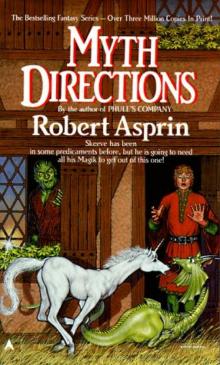 Myth Directions m-3
Myth Directions m-3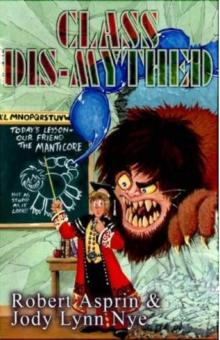 Class Dis-M.Y.T.H.ed
Class Dis-M.Y.T.H.ed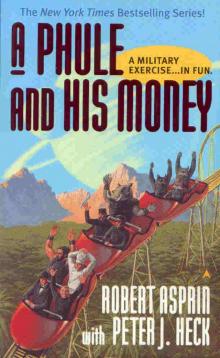 A Phule and His Money
A Phule and His Money Aftermath tw-10
Aftermath tw-10 The House That Jack Built
The House That Jack Built Stealers' Sky tw-12
Stealers' Sky tw-12 Uneasy Alliances tw-11
Uneasy Alliances tw-11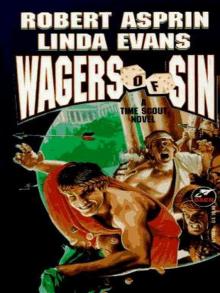 Wages of Sin
Wages of Sin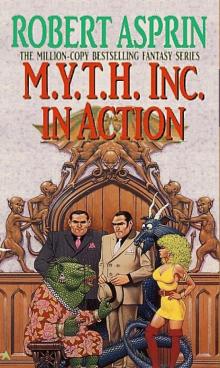 M.Y.T.H. Inc In Action m-9
M.Y.T.H. Inc In Action m-9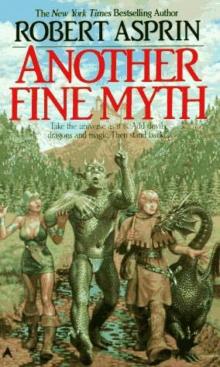 Another Fine Myth
Another Fine Myth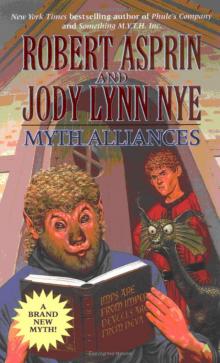 Myth Alliances
Myth Alliances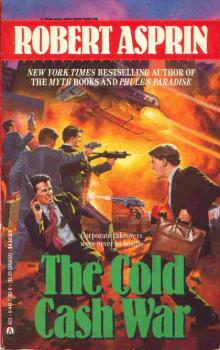 The Cold Cash War
The Cold Cash War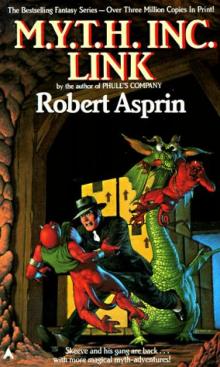 M.Y.T.H. Inc. Link m-7
M.Y.T.H. Inc. Link m-7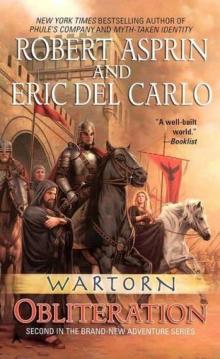 Wartorn Obliteration w-2
Wartorn Obliteration w-2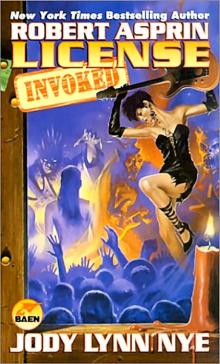 License Invoked
License Invoked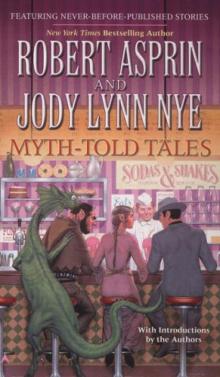 Myth-Told Tales m-13
Myth-Told Tales m-13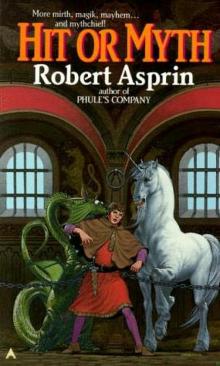 Hit Or Myth
Hit Or Myth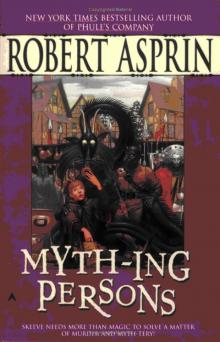 Myth-Ing Persons
Myth-Ing Persons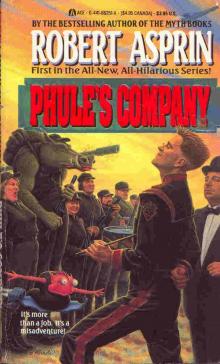 Phule's Company
Phule's Company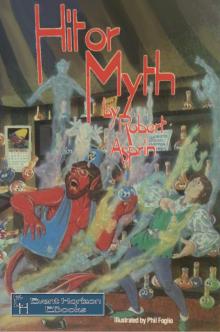 MA04 Hit or Myth
MA04 Hit or Myth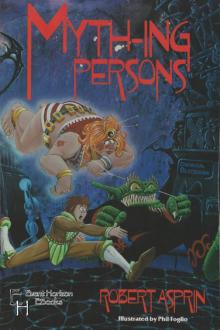 MA05 Myth-ing Persons
MA05 Myth-ing Persons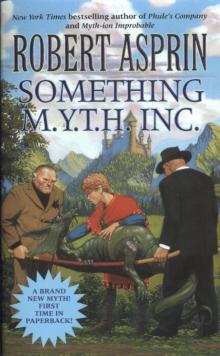 Something MYTH Inc m-12
Something MYTH Inc m-12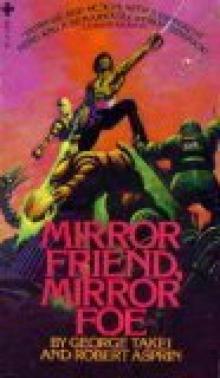 Mirror Friend, Mirror Foe
Mirror Friend, Mirror Foe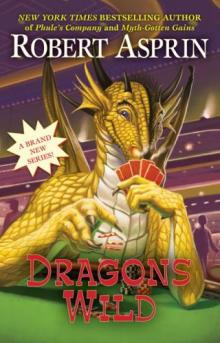 Dragons Wild gm-1
Dragons Wild gm-1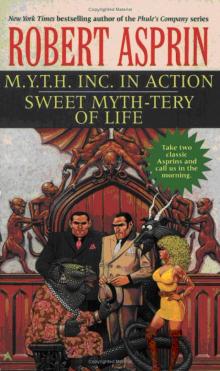 M.Y.T.H. Inc in Action
M.Y.T.H. Inc in Action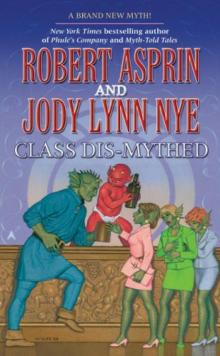 Class Dis-Mythed m-16
Class Dis-Mythed m-16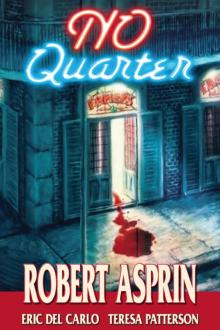 NO Quarter
NO Quarter